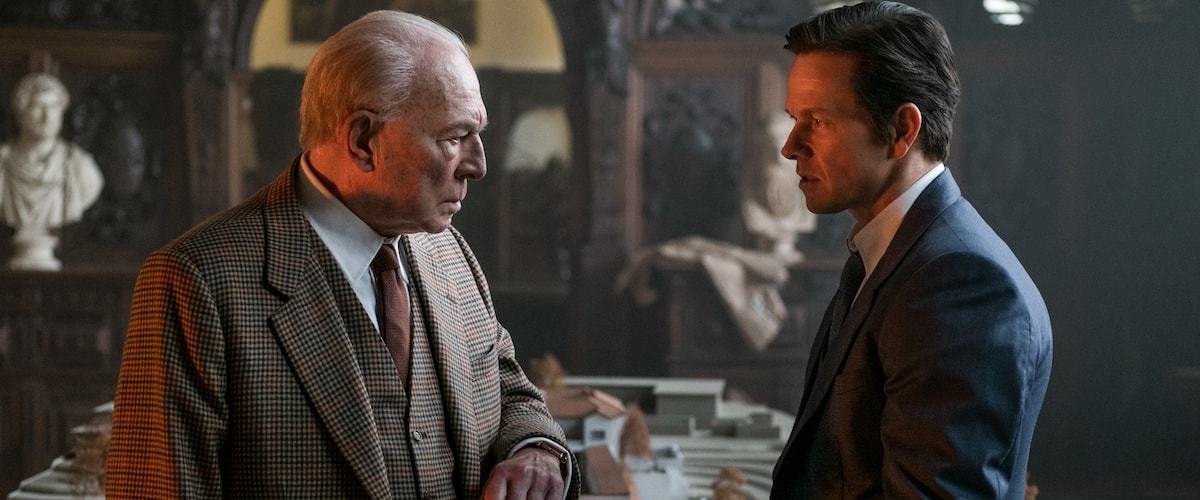
Directed by: Ridley Scott
Starring: Michelle Williams, Christopher Plummer, Mark Wahlberg, Charlie Plummer, Romain Duris, Timothy Hutton, Andrew Buchan
The back story behind the making of All the Money in the World is more famous now than the story on which the movie is based. For those unaware, the film was to star Kevin Spacey in the role of J. Paul Getty, the billionaire whose miserly ways cause him to balk at paying any ransom for his kidnapped grandson in 1973 Italy. The film was completed and days away from its world premiere when Spacey was soon disgraced by numerous accusations of sexual misconduct. In an unprecedented move, director Ridley Scott hired Christopher Plummer to play the Getty role, requiring nine days of reshoots and eliminating Spacey from the finished product. All of this while not changing the Christmas 2017 release date. For those who saw Spacey in the fall trailers, this will be the only time you would ever get to see him anywhere in the movie.
The film itself is as cold and ruthless as Getty himself. It is not a conventional thriller in which the police and Getty security chief Fletcher Chase (Wahlberg) track down the kidnapped Getty in a race against time. The reason Chase is dispatched to assist in the rescue is to allow Getty to get away with not paying any ransom money, not because of any grandfatherly love, which old man Getty surely lacks in any capacity. Plummer's performance at first disarms you as he holds his young grandson's hand in flashbacks showing him his latest acquisitions. We think there may be some humanity lurking beneath the icy oil tycoon who by 1973 was the richest man in the history of the world. But, as the film progresses, and as Chase negotiates the ransom amount down, we see this is not the case. Getty won't do anything unless it somehow enriches him even a few pennies more. This may be the only man in history who allows tax law to dictate how much he pays for a kidnap ransom.
In the center of this world is Getty's former daughter-in-law and Getty III's mother Gail (Williams), who only wants her son back and must rely on the elder Getty's money to achieve that goal. She can barely gain an audience with him, let alone ask for help. We see flashbacks which reveal how her relationship with Getty became so estranged. The story was rather simple. Getty was filthy rich and would rather die than part with any of his fortune. When Chase asks Getty how much it would take to make him feel secure, Getty replies, "More", as if it were the most spoken word in his vocabulary.
Plummer's performance sets the stage for the entire world of this film, in which compassion is an unheard of term. Young Getty is trapped in a nightmare from which there is no escape. Only a sympathetic captor (Duris) buys him any sort of time from being killed as the old man continually refuses payment. The film provides the standard disclaimer about how it was based on a true story while certain scenes were altered for dramatic effect. I almost don't want to know all of the details of the real story, because it may dispel the effective mood which envelops this film. The kidnapping is only a subtext to the real story; which may be true of many super rich people, and that is the accumulation of assets overrides any mercy, decency, or family. Getty is never seen enjoying his wealth. In fact, during his stay in a fancy Italian hotel, he launders his own clothes to avoid paying the hotel to do so. He will put himself through extraordinary inconvenience to avoid paying for convenience.
Besides Plummer's gutsy, fearless portrayal, Williams carves her own niche and maybe even the only remaining scruples in this bizarre story. Wahlberg is fine, but has to take a backseat to the more powerful performances in the film. I surely won't say how the film ends, but we learn Getty himself set up his life as almost a hostage to his own fortune. And he wouldn't have had it any other way, which makes it all the sadder. Scott deserves kudos for structuring a film without any true emotional catharsis, just bitterness, shallowness, and a thorough example of how Getty seemingly sold his soul for the almighty dollar. The question is: How much soul did he have to sell in the first place?
No comments:
Post a Comment